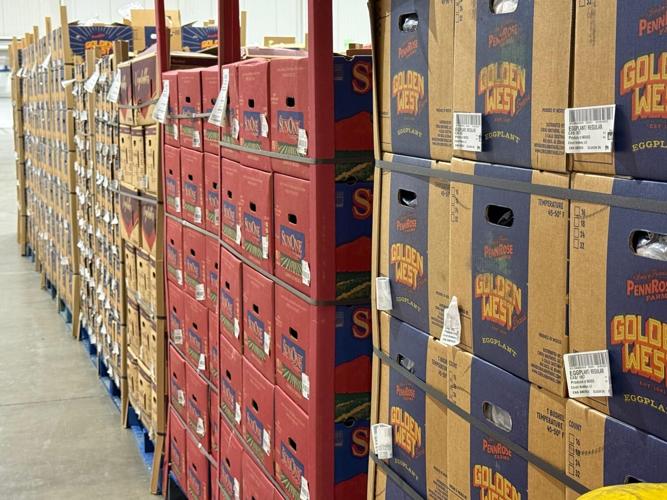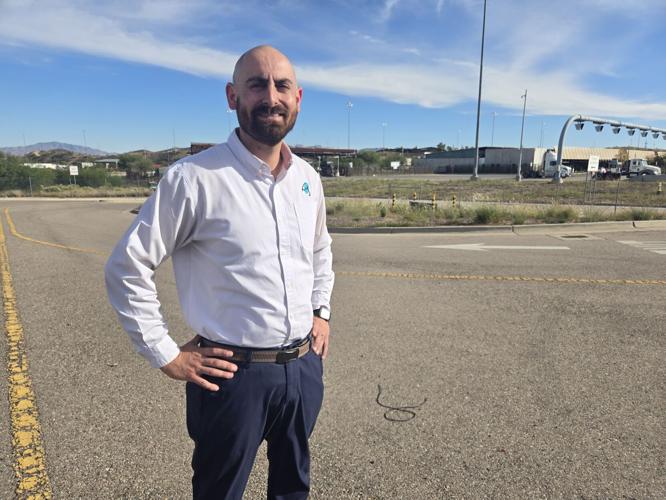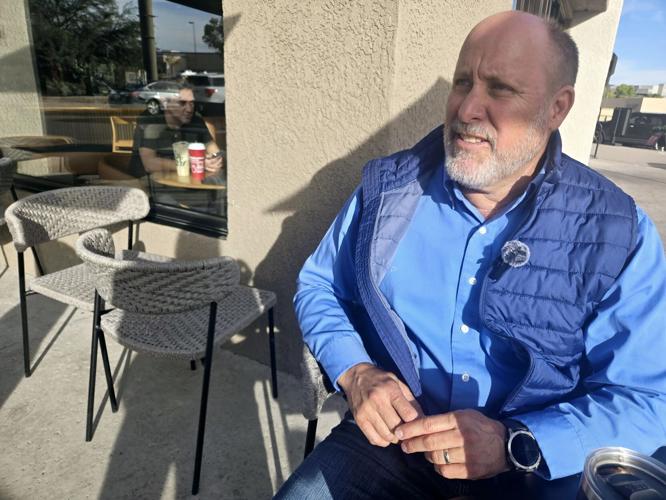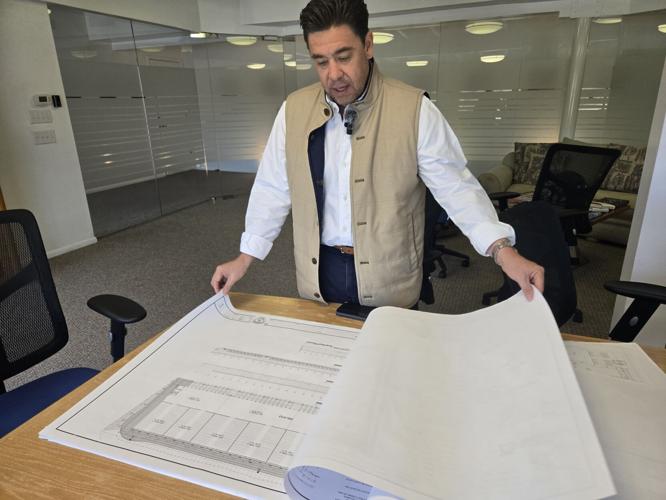
Crates of produce sit at the CMV Warehouse in Nogales, Arizona. (Courtesy of Luis Ramirez Thomas)
NOGALES, Ariz. – As political tensions rise and the threat of new tariffs casts uncertainty over North American trade, southern Arizona’s border trade leaders are taking their message directly to Washington, D.C., ahead of the U.S.-Mexico-Canada Agreement (USMCA) review.
The USMCA, which went into effect on July 1, 2020, is the free trade pact that replaced the North American Free Trade Agreement (NAFTA) to strengthen trade relations and economic cooperation among the United States, Canada and Mexico.
Ahead of the agreement’s review hearings scheduled to take place Dec. 3–5, the Greater Nogales Santa Cruz County Port Authority submitted a detailed comments letter to the Office of the U.S. Trade Representative, urging officials to invest in the border infrastructure, technology and coordination needed to keep supply chains moving efficiently and the economy growing. Now, the group is preparing to deliver its message in person to lawmakers and federal officials.
Port Authority Chairman Josh Rubin and Luis Ramírez, president of Ramirez Advisors Inter-National, are scheduled to present during the USMCA review. Their goal is to defend the continuation of the trilateral agreement and highlight Nogales’ economic importance.
“For us, it’s essential to be at the table so they understand what we see here every single day. People in Washington aren’t at the border — we are,” said Rubin, who also serves as vice president of business development at Javid LLC and a board member of the Index Nogales, the Sonora Maquiladora Association. “It’s important for them to hear our perspective and ensure Nogales stays on the map as decisions and recommendations are made.”

Josh Rubin, chairman of the Greater Nogales Santa Cruz County Port Authority, stands outside the Mariposa Port of Entry in Nogales, Arizona. (Dawn Page/CALÓ News)
Their visit comes amid growing concern over potential tariff changes. The planned Nov. 1 implementation of new tariffs was delayed following discussions between Mexico’s President Claudia Sheinbaum and U.S. President Donald Trump, but trade experts say the pause provides little clarity.
Without a written agreement establishing whether the delay will last one month, three months or longer, business leaders say planning for the upcoming season — and making long-term investments — has become increasingly difficult.
Nogales’ key role in US economy
A 25% tariff currently applies to all parts coming from Mexico. Companies that comply with USMCA regulations and can verify that a part was made in one of the three member countries are exempt. But if the extension is not granted, even compliant goods could face tariffs, significantly increasing costs, disrupting supply chains and driving up prices.
“Infrastructure, technology and binational coordination are critical,” Ramírez Thomas said. “You can’t just say stop importing from China or India. If there is no North American alternative for a product, part or component, companies can’t simply shut down their operations overnight. We need to give allowances to find alternatives, develop them at scale and eventually transition out of China, India and other parts of the world.”
Based on information from the public comments letter submitted to the U.S. Trade Representative, Nogales plays a key role in the U.S. economy, serving as a primary gateway not only for fresh produce but also for manufacturing goods moving through the North American supply chain. Though the city’s population is just under 20,000, the letter notes that Nogales functions as one of the nation’s most important ports of entry.

Crates of produce sit at the CMV Warehouse in Nogales, Arizona. (Courtesy of Luis Ramirez Thomas)
In 2024, Nogales ports processed 404,588 commercial trucks, 3.78 million passenger vehicles and 10.8 million travelers, facilitating $34.1 billion in total trade — including $10.8 billion in U.S. exports and $23.3 billion in imports.
Arizona’s ports process approximately $40 billion in imports and exports each year, and $34 billion of that passes through Nogales, according to Ramírez Thomas.
“We are fighting way above our weight class,” Ramírez Thomas said. “We are much more important than just the number of people because so much trade and tourism pass through here, which translates into billions of dollars for Arizona and the U.S. economy.”
Ramírez Thomas said many companies that were planning new manufacturing facilities and major distribution centers in Mexico and Canada have paused projects until tariff conditions become clearer.
Rubin said uncertainty is already reshaping business decisions.
“In my business, we are used to getting 15 to 30 leads a year of people interested in moving into Mexico and wanting to understand what Mexico is,” he said. “With uncertainties like potential tariffs, you don’t know if tomorrow it’s 25% or next month 50%. That pause and hesitation affects the actual movement of dollars, which is what the economy needs to grow.”
He added that some industries face even greater challenges.
“There are challenges for certain industries like electronics, where we get most of our chips and raw materials from Asia,” he said. “Mexico, the U.S. and Canada don’t produce all the raw materials we need, so we still have to source from places like Germany for specific metals. Automotive, connectors and pharmaceutical industries are heavily impacted.”
Rubin said any revised agreement must include provisions for stronger infrastructure and investment at ports of entry “to get products across the border faster and safer.”
Brokers navigate costly consequences
For Nogales customs brokers, staying ahead of tariff changes is crucial. Gustavo Acosta, vice president and general manager of RL Jones Customs Brokers and president of the Nogales Customs Brokers Association, said brokers are on the front lines of compliance.

Gustavo Acosta, vice president and general manager of RL Jones Customs Brokers, outside a Starbucks in Nogales, Arizona. (Dawn Page/CALÓ News)
“Our process is extremely important because we represent clients in declaring goods — if we don’t get it right, it directly impacts them,” Acosta said. “We need to stay on top of all information, maintain constant communication with CBP and coordinate with industries and associations to ensure compliance.”
He said efficient communication between U.S. and Mexican customs is vital.
“When Mexican and U.S. customs communicate effectively, trucks can move faster and the economy functions more efficiently,” Acosta said. “Without this coordination, the industry slows down.”
Acosta said tariff changes carry significant financial consequences.
“Any change in a tariff can cost thousands of dollars per truck. With 10 to 15 trucks a day, that can add up to millions,” he said. “We are the eyes and advocates for our clients in every aspect.”
He noted that the United States has collected more than $90 billion in tariffs and that a potential Supreme Court ruling against them could trigger widespread refund demands.
Tomato growers still face a 17% dumping fee due to a suspended treaty, though other fresh fruits and vegetables continue moving tariff-free under USMCA.
For produce distributors, the stakes are equally high. Jaime Chamberlain, president of Chamberlain Distributing Inc., said investment decisions require stability.

Jaime Chamberlain, president of Chamberlain Distributing Inc, is interviewed at his office in Nogales, Arizona. (Dawn Page/CALÓ News)
“It has been very difficult for industries, especially for us in the fruit and vegetable business, because we aren’t planning for tomorrow; we’re planning three to five years ahead,” Chamberlain said. “We’re making extraordinary investments in shade netting, plastic and glass greenhouses, salt treatment plants — many large-scale projects. That money isn’t recovered in one season; it takes years.”
He said the threat of tariffs has created instability.
“We have contracts with retailers, food service providers and wholesalers, and we take these commitments very seriously,” Chamberlain said. “These are decades-long relationships we don’t want to lose or delay.”
Looking ahead
All three leaders — Chamberlain, Rubin and Ramírez Thomas— agree that a new trilateral agreement is unlikely. Rubin and Ramírez said the United States will likely negotiate separate agreements with Mexico and Canada.
Chamberlain said Americans must recognize the importance of international trade.
“In the U.S., we need to understand we just can’t farm everything we eat. We need strong trade agreements with Mexico, Canada, and even European countries to ensure fruits and vegetables are available 365 days a year. Our relationship is deeply intertwined in many ways — from manufacturing cars, tractors, and refrigeration equipment to clothing and trading produce. We are deeply rooted in each other’s economies and cultures — and that’s what needs to be understood,” he concluded.
Dawn Page (she/her; Latine) is a freelance writer for CALÓ News. She grew up on the U.S.-Mexico border between Douglas, Arizona, and Agua Prieta, Sonora. She recently earned a Master’s in Bilingual Journalism from the University of Arizona. Her reporting focuses on immigration, borderlands issues, lifestyle, business and entertainment.





















(0) comments
Welcome to the discussion.
Log In
Keep it Clean. Please avoid obscene, vulgar, lewd, racist or sexually-oriented language.
PLEASE TURN OFF YOUR CAPS LOCK.
Don't Threaten. Threats of harming another person will not be tolerated.
Be Truthful. Don't knowingly lie about anyone or anything.
Be Nice. No racism, sexism or any sort of -ism that is degrading to another person.
Be Proactive. Use the 'Report' link on each comment to let us know of abusive posts.
Share with Us. We'd love to hear eyewitness accounts, the history behind an article.